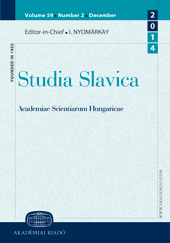Древние фтирофаги и русский экспрессивный этноним колбиты
Ancient ‘lice-eaters’ and Russian expression kolbit
Author(s): Aleksandr I. GrischenkoSubject(s): Theoretical Linguistics, Lexis, Comparative Linguistics, Eastern Slavic Languages, Philology
Published by: Akadémiai Kiadó
Keywords: Russian language; Kazakhstan; ethnolinguistics; dialectology; etymology;
Summary/Abstract: This article deals with the hypothetical connection between the Russian ethnic slur kolbít ‘a Kazakh, especially rural’ used by Russian speakers in Kazakhstan up to the end of the 20th century and the ancient tribe phtheirophagoi ‘lice-eaters’ mentioned by many authors in Antiquity. This tribe was placed by Ptolemy to Asiatic Sarmatia beyond the Lower Volga, the present-day location of the Kazakhstan steppes. Young Russian-speaking respondents have almost forgotten the meaning and connotations of the word kolbit, but their elders remember it as a very derogative term deriving from Kazakh bit ‘a louse’ and even translate it as ‘a liceeater.’ However, it is impossible to etymologize kolbit as a word of Kazakh origin. It may be of Russian origin connected with the root kol(o)b- ‘something round’ or ‘something chopped off’ (in particular, ‘a wooden block’) compared with the Russian ethnic slur churka ‘a non-ethnic Russian, especially from Central Asia’ (literally, ‘a chunk of unworked wood’). These slurs could be linked with the rite of circumcision practiced by Muslims. The article also contains an ethnolinguistic analysis of folk nicknames with louse-components based on lexicographical data and field records gathered in Kazakhstan in 2012 and 2013.
Journal: Studia Slavica Academiae Scientiarum Hungaricae
- Issue Year: 59/2014
- Issue No: 2
- Page Range: 313-329
- Page Count: 17
- Language: Russian
- Content File-PDF

